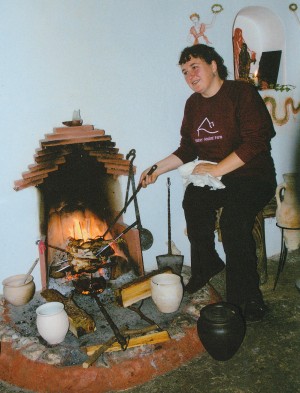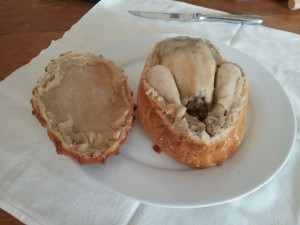Symposiasts at Work: Sally Grainger
Andrew Dalby introduces Symposiast Sally Grainger

Image credit: Sally Grainger
Sally Grainger began her career as a real hands-on pastry chef. With that background she has now become one of the better-known hands-on food historians. After a decade working as a chef she took up Classical Studies as an undergraduate at Royal Holloway College, and, while doing so, held her first reconstructed Roman banquet (a farewell to Professor Martin West, who was moving to All Souls’, Oxford). In 1996 she and Andrew Dalby wrote The Classical Cookbook, an enduring success, for British Museum Press. The recipes, as authentic as could possibly be achieved, were Sally’s.
Meanwhile, having taken her degree in 1993, Sally began to build a new career in reconstruction archaeology and food writing fed by continuing research. It took time to become known in the academic world of archaeology, with the help of increasing participation in conferences, frequent presence at schools and at historical sites, regular television appearances, a series of invitations to cook and present ancient meals.
Sally has worked with the British Museum (a Roman meal there coincided with the Pompeii exhibition), the Museum of London, Fishbourne Roman Palace, the Roman Baths at Bath, and Colchester Castle. Not to mention the Getty Villa near Malibu, where as food consultant she has organized three large scale meals, Greek, Roman and Byzantine, in a uniquely authentic setting. She has often been seen on Time Team, also on Neil Oliver’s A History of Ancient Britain, Rome’s Lost Empire with Dan Snow, a forthcoming Pompeii series with Michael Buerk; she has fed the Hairy Bikers.
And meanwhile she and her partner Chris Grocock, a medieval Latinist, have produced what is now the standard bilingual edition of Apicius, the Roman cookbook, and a practical companion, Cooking Apicius. These were both published by Prospect Books in 2006.
An enduring aim for Sally, through much of this period, has been to understand – and, while understanding, to recreate – garum, the Roman fish sauce. Roman fish sauce: an experiment in archaeology was the title of her MA dissertation at Reading University. Garum, with other salted fish products, will be the theme of her book now in preparation for Ashgate Publications. Each tasting of garum as made by Sally brings one closer to the real thing, as she is able to show experimentally by residue analysis using reproduced ancient vessels. She’s nearly there.

Image credit: Sally Grainger
Books by Sally Grainger
The Classical Cookbook, British Museum Press 1996 (with Andrew Dalby)
Apicius: critical edition with introduction and English translation, 2006, Prospect Books, Totnes (with Christopher Grocock)
Cooking Apicius, 2006, Prospect Books, Totnes.
Papers by Sally Grainger
“Cato’s Roman cheesecake: the baking techniques” in Milk: Beyond the Dairy: Proceedings of the Oxford Symposium on Food and Cookery 1999, ed. Harlan Walker, Prospect Books, 2000
“Moretum: a peasant lunch revisited” in The Meal: Proceedings of the Oxford Symposium on Food and Cookery 2001, ed. Harlan Walker, Prospect Books, 2002 (with Christopher Grocock)
“What’s cooking? New (and old) in ancient food studies” in Amphora: a publication of the American Philological Association vol. 4 no. 1, 2005 (with Christopher Grocock)
“Towards an authentic Roman sauce” in Authenticity in the Kitchen: Proceedings of the Oxford Symposium on Food and Cookery 2005, ed. Richard Hosking, Prospect Books, 2006
“Was Roman fish sauce rotten?” in Omnibus no. 53, January 2007
“The patina in Apicius” in Eggs in Cookery: Proceedings of the Oxford Symposium on Food and Cookery 2006, ed. Richard Hosking, Prospect Books, 2007
“The myth of Apicius” in Gastronomica: The Journal of Food and Culture vol. 7 no. 2, 2007, pp. 71-77
“A new approach to Roman fish sauce” in Petit Propos Culinaires no. 83, July 2007, pp. 92-111
“Roman fish sauce: an experiment in Archaeology” in euroREA. Journal for (Re)construction and Experiment in Archaeology, http://journal.exarc.net/issue-2012-1
“Roman fish sauce: fish bone residues and the practicalities of supply” in Fish and Fishing: archaeological, anthropological, taphonomical and ecological perspectives; proceedings from the I.C.A.Z. Fish Remains Working Group, Jerusalem, October 22nd- 30th 2011. Archaeofauna: international journal of zooarchaeology vol. 22 (October 2013) pp. 13-28
“Garum, Liquamen and Muria: a new approach to the problem of definition” in Fish and ships: production and commerce of salsamenta during antiquity, Rome 18-22 juin 2012 ed. Emmanuelle Botte, Victoria Leich. Bibliothèque d’Archéologie Méditeranéenne et Africaine 17 (Centre Camille Julien, Aix-en Provence, 2014) pp. 37-46
Forthcoming: ‘Roman fish sauces and their amphorae: shape and function and the practicalities of supply’ presented at Recursos del mar y productos transformados en época Romana (Mediterráneo occidental – Atlántico): estado de la cuestión y perspectivas (Casa de Velazquez, March 2015)
Forthcoming: “Roman fish sauce: amphora shape, fish sauce residues and practicalities of supply” presented at Fishing through time: archaeoichthyology, biodiversity, ecology and human impact on aquatic environments (International Council of Archaeology, Lisbon, Septenber 28th-October 3rd 2015)
Forthcoming: “Vinidarius and his Brevis Pimentorum: the Transition from Roman to Medieval as seen through the use of spices and seasoning” presented at Leeds International Medieval Conference (July 2016)
